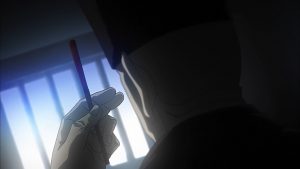 3,625 days. 87,000 hours. 5,220,000 minutes. Two moves to Japan. That’s how much time has passed since I started blogging Hyouge Mono. Needless to say there’s nothing else in the annals of this website or my life as an anime fan remotely like that – as a subject, it’s unique. And somehow that seems totally appropriate, because this series is pretty much singular among anime in every sense of the word.
3,625 days. 87,000 hours. 5,220,000 minutes. Two moves to Japan. That’s how much time has passed since I started blogging Hyouge Mono. Needless to say there’s nothing else in the annals of this website or my life as an anime fan remotely like that – as a subject, it’s unique. And somehow that seems totally appropriate, because this series is pretty much singular among anime in every sense of the word.
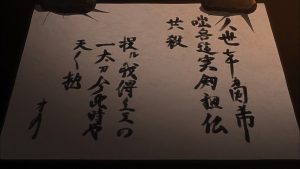 If I were smarter, I would have waited a few more weeks and covered the final episode on the 10th anniversary of that first post. It would certainly have had a certain poetry to it. But honestly, I’ve always watched this series whenever the mood struck me – and that extends to picking it up again after having left it for more than seven years. If there’s any downside to anime’s gradual quality decline – and 2020 being its worst year on record, probably – it’s that it (and the pandemic) gave me the opportunity to go back to this show.
If I were smarter, I would have waited a few more weeks and covered the final episode on the 10th anniversary of that first post. It would certainly have had a certain poetry to it. But honestly, I’ve always watched this series whenever the mood struck me – and that extends to picking it up again after having left it for more than seven years. If there’s any downside to anime’s gradual quality decline – and 2020 being its worst year on record, probably – it’s that it (and the pandemic) gave me the opportunity to go back to this show.
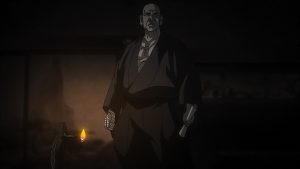 But Hyouge Mono never left me, even if I left it. I never stopped thinking about it. And it was remarkably easy to get back into the same frame of mind as soon as I started watching it again, because it’s not a frame I’m in watching anything else. There are bits of it in other series, but nothing like the full package. This is history unlike any I’ve seen before. I think Hyouge Mono is to history what Shinkai Makoto’s drawings are to photo-realism – and if you love Shinkai, I believe you’ll understand what I mean.
But Hyouge Mono never left me, even if I left it. I never stopped thinking about it. And it was remarkably easy to get back into the same frame of mind as soon as I started watching it again, because it’s not a frame I’m in watching anything else. There are bits of it in other series, but nothing like the full package. This is history unlike any I’ve seen before. I think Hyouge Mono is to history what Shinkai Makoto’s drawings are to photo-realism – and if you love Shinkai, I believe you’ll understand what I mean.
 As endings go, this was one of the best. Even with the liberties it takes there are certain historical intersections Hyouge Mono must reach, and the death of Sen no Rikyu is one of them. The exact circumstances it had the liberty to spin any way it wished, since in fact little is known about the true details of the event apart from that Hideyoshi ordered it, and it happened. There was a tea ceremony; Rikyu did smash the bowl, he did write the poem. Furuta Oribe was not there, and in fact Rikyu invited several guests and gave each a precious item of tea ware as a remembrance. But as ever, the way this series depicts events is more dramatic than what we know of the truth.
As endings go, this was one of the best. Even with the liberties it takes there are certain historical intersections Hyouge Mono must reach, and the death of Sen no Rikyu is one of them. The exact circumstances it had the liberty to spin any way it wished, since in fact little is known about the true details of the event apart from that Hideyoshi ordered it, and it happened. There was a tea ceremony; Rikyu did smash the bowl, he did write the poem. Furuta Oribe was not there, and in fact Rikyu invited several guests and gave each a precious item of tea ware as a remembrance. But as ever, the way this series depicts events is more dramatic than what we know of the truth.
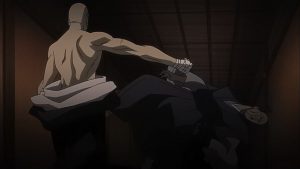 From the moment the hail began to fall as if betraying the wrath of the Gods, there was an air of tension and somber unease hanging over this episode. Rikyu expresses the desire to “die beautifully”, but his definition of that is a reflection of just what a profoundly powerful man he is as depicted here. He does things on his own terms, refusing to wear the white robes of death and making a mockery of those sent to guard him. He projects fury over events so as to ease the guilt of those around him. “What a man!” indeed, Sasuke. Rikyu is the towering presence that hangs over everything in Hyouge Mono – he defines the era more than even Hideyoshi or Nobunaga, and arguably has more influence on events.
From the moment the hail began to fall as if betraying the wrath of the Gods, there was an air of tension and somber unease hanging over this episode. Rikyu expresses the desire to “die beautifully”, but his definition of that is a reflection of just what a profoundly powerful man he is as depicted here. He does things on his own terms, refusing to wear the white robes of death and making a mockery of those sent to guard him. He projects fury over events so as to ease the guilt of those around him. “What a man!” indeed, Sasuke. Rikyu is the towering presence that hangs over everything in Hyouge Mono – he defines the era more than even Hideyoshi or Nobunaga, and arguably has more influence on events.
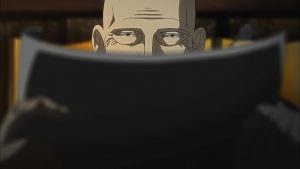 Yet, Sasuke is still the protagonist of this series. He is by no means a great man in the sense that his master is, but he is unique. He has a way of seeing truths others would miss. He had to be directly involved in these events whether the textbooks say he was or not. Hideyoshi makes that happen by asking that Sasuke assist at Riku’s seppuku, and remove the master’s head to deliver to him. Sasuke is naturally horrified by this, even when Hideyoshi promises that he’ll be the new master of the tea ceremony in Rikyu’s place. He begs to be let off even then, even knowing that without his title he’s nothing – lacking a hereditary fortune or lands, everything he defines himself by would be ripped away from him.
Yet, Sasuke is still the protagonist of this series. He is by no means a great man in the sense that his master is, but he is unique. He has a way of seeing truths others would miss. He had to be directly involved in these events whether the textbooks say he was or not. Hideyoshi makes that happen by asking that Sasuke assist at Riku’s seppuku, and remove the master’s head to deliver to him. Sasuke is naturally horrified by this, even when Hideyoshi promises that he’ll be the new master of the tea ceremony in Rikyu’s place. He begs to be let off even then, even knowing that without his title he’s nothing – lacking a hereditary fortune or lands, everything he defines himself by would be ripped away from him.
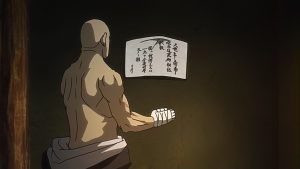 Hideyoshi is persuasive in the end – in part by offering to spare the life of Hosokawa Tadaoki, who forfeited his right to it by openly seeing Rikyu off to exile. But more, he does so by revealing to Sasuke just how pathetically needly and lonely he is, and how distraught he is over what’s about to happen. Hideyoshi, for all his sins (not least Oda’s murder, in which he co-conspired with Rikyu), comes off as a tragic figure in Hyouge Mono. It’s clear that despite his relentless drive to dominate, to prove himself to his so-called betters, none of this has really given him any happiness. And he was not immune to Rikyu’s pull – he loved the man too, just like so many others did.
Hideyoshi is persuasive in the end – in part by offering to spare the life of Hosokawa Tadaoki, who forfeited his right to it by openly seeing Rikyu off to exile. But more, he does so by revealing to Sasuke just how pathetically needly and lonely he is, and how distraught he is over what’s about to happen. Hideyoshi, for all his sins (not least Oda’s murder, in which he co-conspired with Rikyu), comes off as a tragic figure in Hyouge Mono. It’s clear that despite his relentless drive to dominate, to prove himself to his so-called betters, none of this has really given him any happiness. And he was not immune to Rikyu’s pull – he loved the man too, just like so many others did.
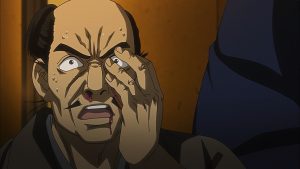 Sasuke relents in the end. And he calls in his favor to Date to have him call off the dogs, which was Rikyu’s wish – he wanted no blood shed in trying to save him from a fate he engineered himself. He never forgets himself, and right to the final moment thinks of his disciples. He even forces Sasuke into a moment of mirth, so as to impress upon him that this is his true self – a man who embraces the joys of life, not a stolid warrior chained for eternity to duty. Surely in the end it’s a kindness to have his closest disciple at his side at the end, no matter Sasuke’s role. Rikyu’s final words are dignified and, as always, controlled – “It hurts. Hurry.”
Sasuke relents in the end. And he calls in his favor to Date to have him call off the dogs, which was Rikyu’s wish – he wanted no blood shed in trying to save him from a fate he engineered himself. He never forgets himself, and right to the final moment thinks of his disciples. He even forces Sasuke into a moment of mirth, so as to impress upon him that this is his true self – a man who embraces the joys of life, not a stolid warrior chained for eternity to duty. Surely in the end it’s a kindness to have his closest disciple at his side at the end, no matter Sasuke’s role. Rikyu’s final words are dignified and, as always, controlled – “It hurts. Hurry.”
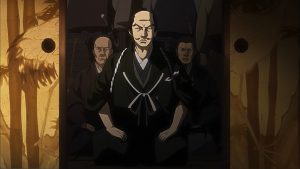 I won’t be forgetting the image of Sasuke, Rikyu’s head tucked under his arm, facing an army of bowed forms as he emerges from Rikyu’s villa. It’s a fitting way to end this series, those two being the thread that tied the entire story together. There’s much more to that story – the anime ended after nine volumes but the manga ran for twenty-five, chronicling Sasuke’s life as a tea master and powerhouse of tea wares (he would live for another 25 years after these events took place). But this in no way feels incomplete – it works both poetically and prosaically to complete the take the anime is telling. I wouldn’t change a frame.
I won’t be forgetting the image of Sasuke, Rikyu’s head tucked under his arm, facing an army of bowed forms as he emerges from Rikyu’s villa. It’s a fitting way to end this series, those two being the thread that tied the entire story together. There’s much more to that story – the anime ended after nine volumes but the manga ran for twenty-five, chronicling Sasuke’s life as a tea master and powerhouse of tea wares (he would live for another 25 years after these events took place). But this in no way feels incomplete – it works both poetically and prosaically to complete the take the anime is telling. I wouldn’t change a frame.
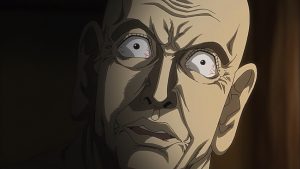 Skidda asked in the comments some weeks back whether Hyouge Mono would have ranked in my Top 20 series of the 2010’s if I’d finished it at the time I was compiling that list. I can’t say for certain as my mindset then was a snapshot in time, and because my views on this series are shaped by the unique manner in which I consumed it. I suspect it would have made it onto that list (though I don’t know what I would have left off to make room), because it really is a masterpiece of that magnitude. But I’m almost happier this way, because it stands alone – a series I took a decade to cover, and one which defies categorization or comparison. Hyouge Mono is an anime of another time, one which we’ll never see again, but that’s all the more reason – 2011 or 2021 – to celebrate that it exists.
Skidda asked in the comments some weeks back whether Hyouge Mono would have ranked in my Top 20 series of the 2010’s if I’d finished it at the time I was compiling that list. I can’t say for certain as my mindset then was a snapshot in time, and because my views on this series are shaped by the unique manner in which I consumed it. I suspect it would have made it onto that list (though I don’t know what I would have left off to make room), because it really is a masterpiece of that magnitude. But I’m almost happier this way, because it stands alone – a series I took a decade to cover, and one which defies categorization or comparison. Hyouge Mono is an anime of another time, one which we’ll never see again, but that’s all the more reason – 2011 or 2021 – to celebrate that it exists.


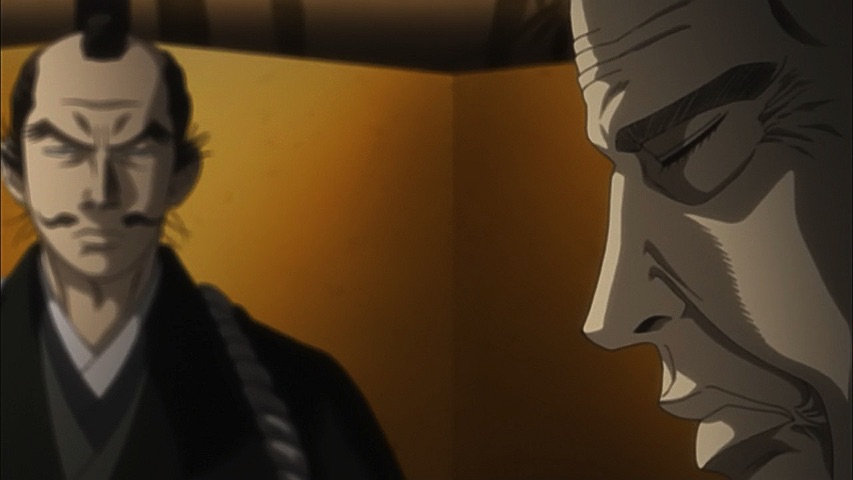
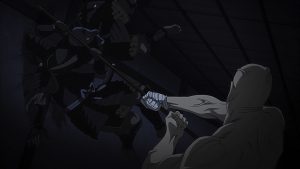

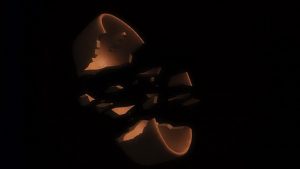
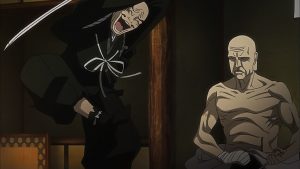
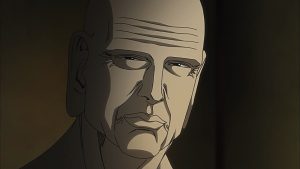
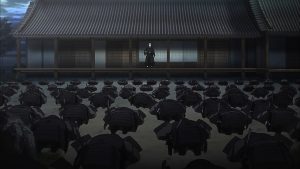
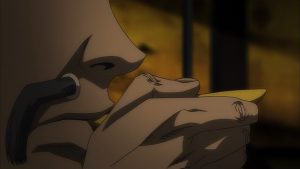
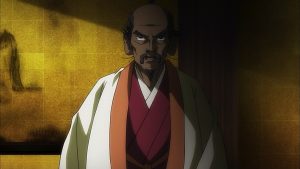
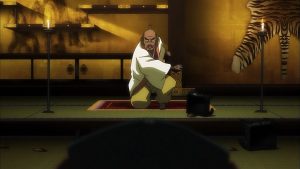
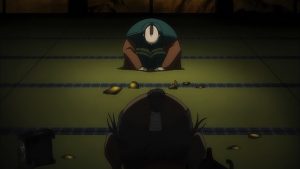
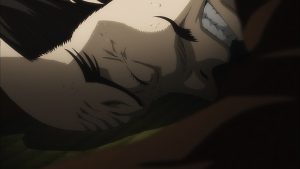
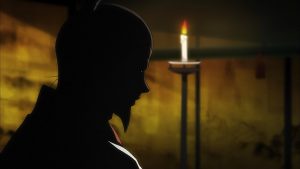
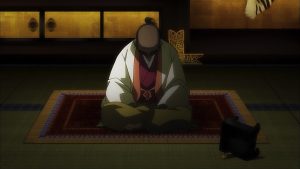
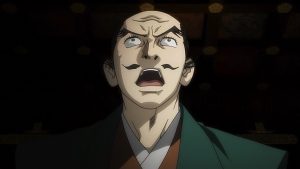

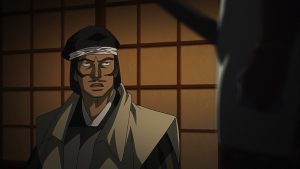
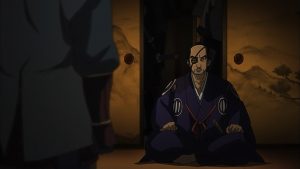
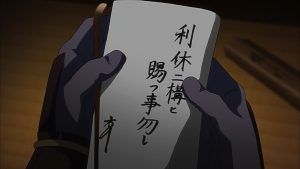

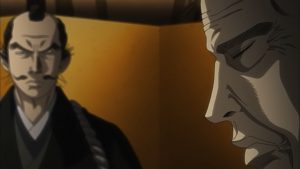
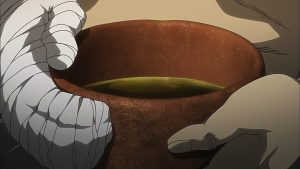
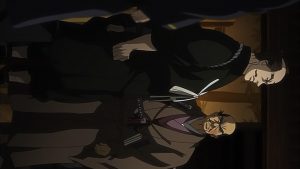
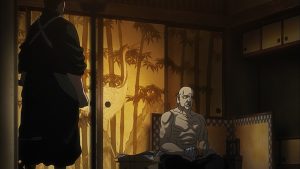


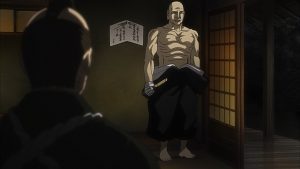
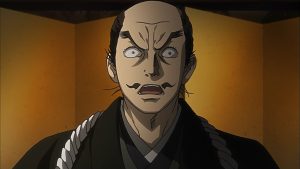
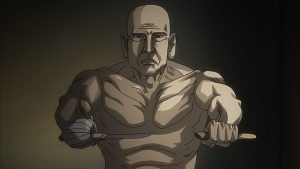
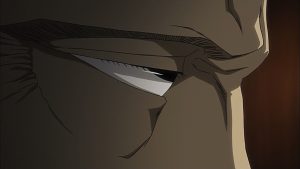
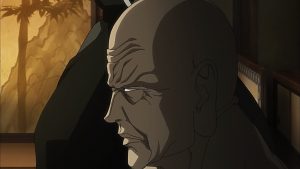
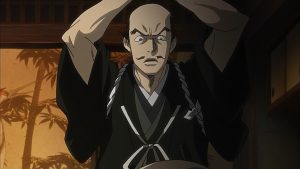

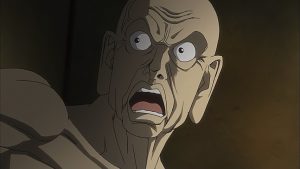
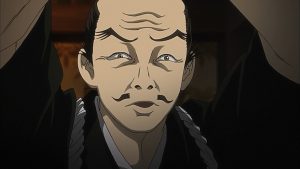
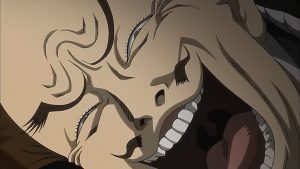
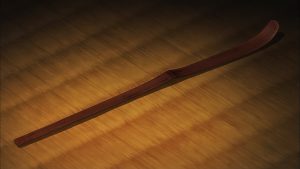
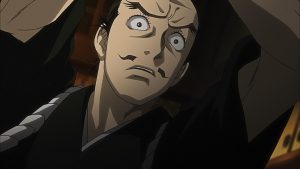
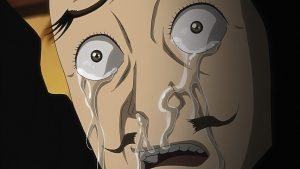
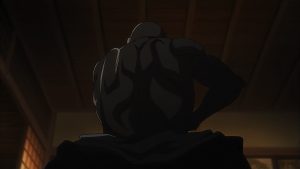

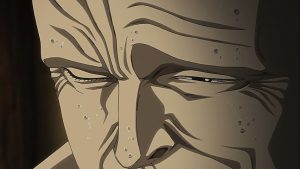
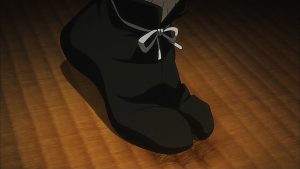

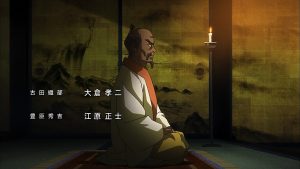

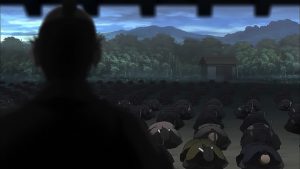

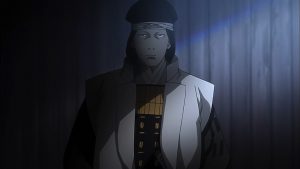
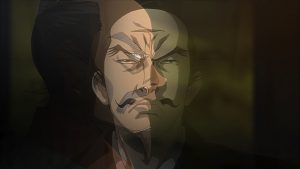

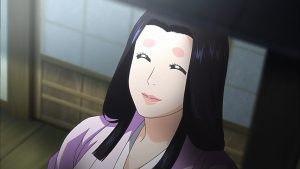
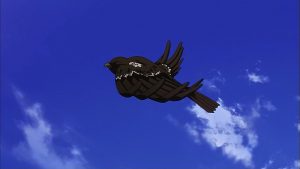
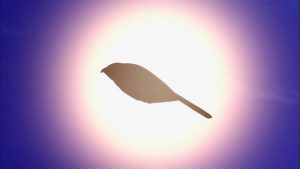



Skidda
March 15, 2021 at 5:01 amThank you for reviewing this series, I’m really glad you went back to finish it. Hyouge Mono has always been good with its death scenes (Akechi’s last episode was amazing) and this one was no exception. I agree that it’s not a bad way to finish the anime adaptation, given how proeminent Rikyu was in the narrative, but maybe I’m just used to this kind of unfinished adaptation.
And if you ever have an another crave for historical work, you could check the manga Showa-shi (published in english a few years ago as Showa, a history of Japan) by Mizuki Shigeru. It’s both an autobiography and a global look (politic/economic/social) at that period of japanese history, though of course WW2 is quite central given its importance and Mizuki’s own experience. It’s quite unique (especially if you never read one of his other autobiographies) but in a very different way than Hyouge Mono.
Guardian Enzo
March 15, 2021 at 10:07 amThat’s in the pile for sure. I suspect I’ll probably read the rest of the Hyouge Mono manga first, and that will take a while.
Derrick
March 15, 2021 at 7:56 amThis and Thermae Romae have a certain feeling to it .
Guardian Enzo
March 15, 2021 at 10:16 amThat’s certainly not a link I would have jumped to immediately but I can sort of see it.
Nadavu
March 17, 2021 at 7:06 amWow, congratulations! Can’t believe it’s been ten years since that WTF-did-I-just-watch moment I had with the first episode. Never watched the second, but couldn’t quite forget the first.
Red
March 17, 2021 at 5:26 pmJust started this for curiosity’s sake since you made the analogy with Shinkai and I can sort of see the deal, there’s a vivid and profound way of which the story tries to reimagine events and characters from long past. Btw if you’ve finished this earlier, would it have entered your top 20 of the decade?
Guardian Enzo
March 17, 2021 at 6:41 pmI think I answered that in the post, no? Probably – but I kind of like that it stands off to the side in its own category.
catterbu
November 9, 2025 at 8:36 amJust finished watching this series. Quite a journey. All the more so for reading your writing on each episode as I went. Not sure if you will ever see this, but thanks for writing about it!
Guardian Enzo
November 9, 2025 at 9:11 amI see it, and you’re welcome. I agree, it’s quite a romp. The manga takes the story a little deeper of course.
catterbu
November 11, 2025 at 1:27 pmah. good to know.